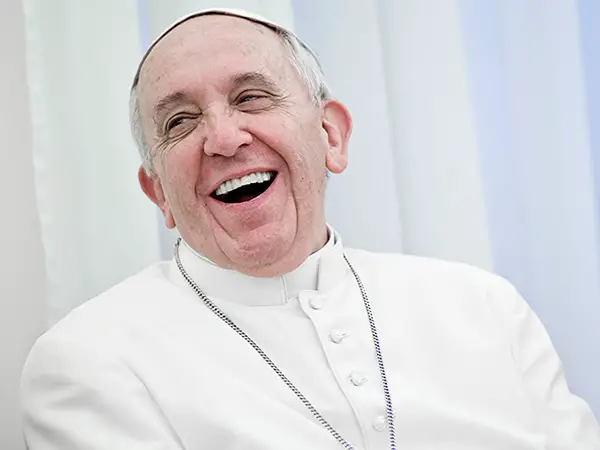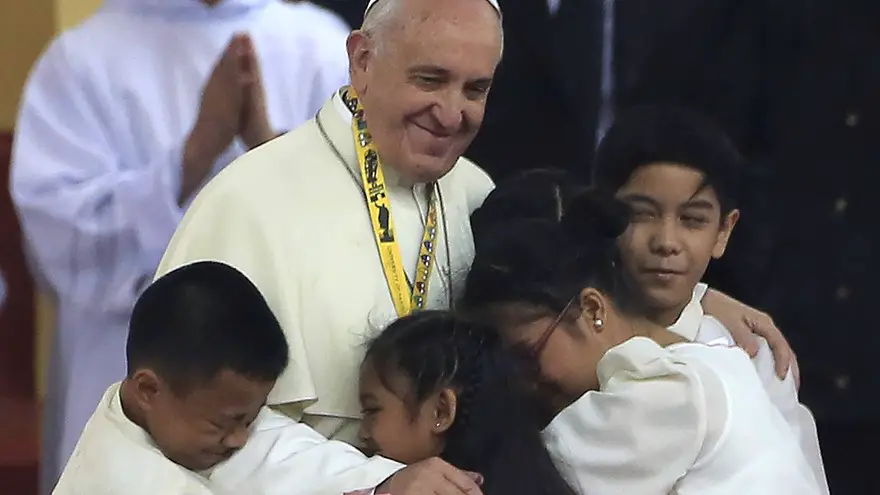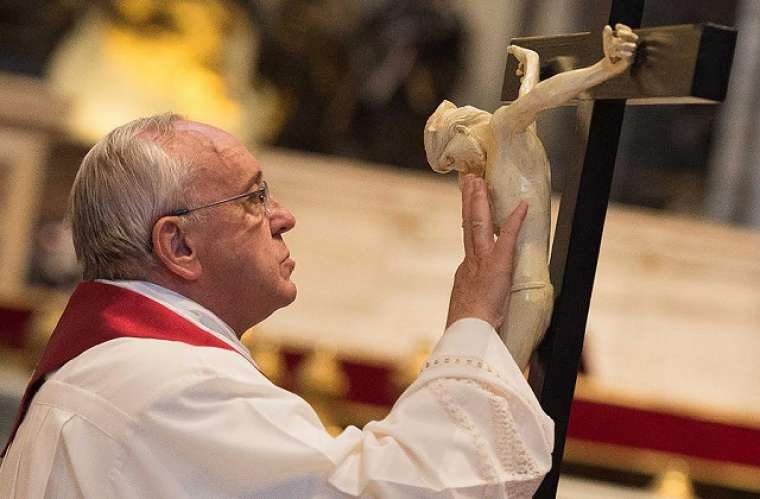Pope Francis is changing the face of what defines Catholicism in the 21st century. He reminded the world of his liberal-leaning outlook just last week when he reportedly told a gay man that God made and loved him as he was.
He has scandalized conservative members of the Church by breaking the mold of previous popes. He’s proven himself to be a man of modest means, showing constant humbleness and supporting those the Church has been known to marginalize.
But Francis is not straying away from the teachings of Catholicism — he’s returning to the message at its core. He preaches similarly to how Jesus did; by accepting everyone, embodying selflessness and spreading love to the polarized. Here are just a few of his quotes that shook up the Vatican and beyond over the past few years.
“Who am I to judge?” – July 2013, regarding gay priests in the Catholic Church
In one of his more famous quotes regarding his stance on homosexuality, Francis said this to reporters aboard the papal airplane on his way back from Brazil. This quote greatly juxtaposed those of his predecessor, who referred to homosexuality as an intrinsic moral evil and an objective disorder. This was especially revolutionary because, at the time, those around him avoided using the colloquial “gay” term at all.
“Women in the church are more important than bishops and priests,” – June 2013, regarding women’s role in the Church.
Traditional patriarchal tendencies are strikingly evident in the Catholic Church. Women are not allowed to be ordained into priesthood, as it says in the Bible that they can neither teach nor have the authority over a man. For this reason, women in the Church are often not taken as seriously as their male peers.
But Francis challenged this traditional notion, citing the importance of women like the Virgin Mary and even referring to the Church itself as feminine in this interview with journalists. He gave the female members of the Church long-deserved recognition by saying that a Church without women cannot be understood.
“Some think — excuse me if I use the word — that in order to be good Catholics, we have to be like rabbits — but no,” – January 2015, regarding the Church’s ban on contraception.
Any type of birth control has always been a controversial topic in the realm of Catholicism. Francis bluntly acknowledged this issue, suggesting that Catholics shouldn’t feel pressured to endlessly procreate, especially if it puts their health at risk. This quote was especially controversial due to the informal nature of his language.

“I believe in God, not in a Catholic God; there is no Catholic God,” – September 2013, regarding the need of religious unity.
Here, the pope proved that his beliefs don’t always directly coincide with those of the Church. “This Vatican-centric view neglects the world around us,” said Francis. “I’ll do anything I can to change it.”
The pope prioritizes bringing people together in faith rather than polarizing them due to insignificant differences. He supports a universal view of God, one that does not have boundaries of religious identity.
“There is no sin that God’s mercy cannot reach and wipe away,” – November 2016, regarding forgiveness for abortions.
Although Francis firmly believes that the sin of abortion is grave in the eyes of the Church, he took a step in November 2016 that no other pope had — offering absolution and forgiveness for those who committed it. He promptly granted the power to any priest to absolve the sin of abortion to anyone looking for forgiveness. Before this, it was a lot harder for a woman who had an abortion to obtain this absolution.
“Evolution in nature is not inconsistent with the notion of creation, because evolution requires the creation of beings that evolve,” – October 2014, claiming Evolution and Creation are not mutually exclusive.
In the traditionalist sense, Catholicism did not teach evolution as part of God’s Creation. Creationists, who believe the Creation Story in the Bible to be the inherent truth of the beginning of time, have long been at odds with scientists over natural selection.
Francis, however, warns against this fundamentalist interpretation. “We run the risk of imagining God was a magician, with a magic wand able to do everything,” he said. “But that is not so.” Francis believes the previously competing beliefs of Evolution and Creation can co-exist with the right perspective and an open mind.

“Watch out against the terrorism of gossip!” – December 2014, regarding the existing bureaucracy in the Vatican.
This was one of the pope’s most controversial statements, attacking his own Church’s central administration. He referred to it as having spiritual Alzhemier’s and existential schizophrenia, and denounced hypocritical members for having a lust for power. He urged members of the Vatican to stay focused on their mission as servants and worshippers of God rather than getting caught up in the power politics of institutional religion.
“God is not afraid of new things,” – October 2014, regarding the Church’s stance on homosexuality and divorce in a modern world.
Advocating for one of his most liberal ideals, Francis constantly calls on the Church to adapt to the changing conditions of the world. He prioritizes the acceptance and forgiveness of other members of the Church over traditionalist mentalities. He is willing to extend love to even the most scrutinized members — LGBTQ+ and divorcees — in the same way that Jesus extended love to tax collectors and prostitutes.
Pope Francis may seem as though he’s presenting groundbreaking and controversial ideas to an unfamiliar and uncomfortably traditionalist crowd, but this isn’t the first time his religion has seen this. The very figure worshipped in every Catholic Church (i.e. Jesus) behaved in a similar way during His time, going against traditional norms and sticking to the basic tenets of acceptance, love and forgiveness.
The sooner more conservative Catholics understand their judgment of their pope is hypocritical, the sooner he’ll be able to lead the Church to a brighter, more wholesome future.

















